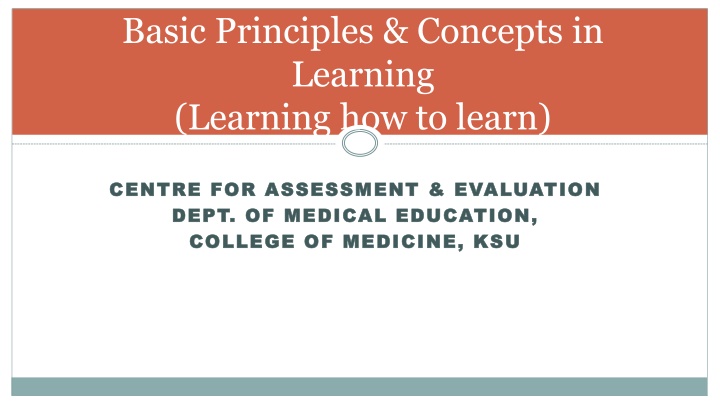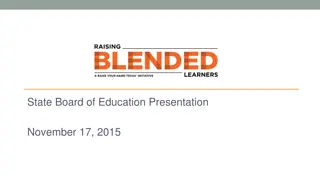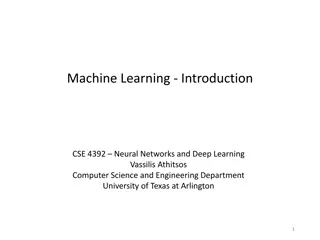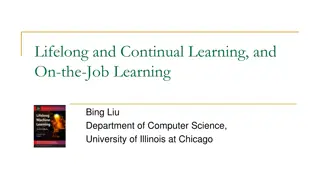
Basic Principles and Concepts in Learning
Explore the fundamentals of learning, including the process of acquisition of knowledge, skills, and attitudes. Discover different teaching and learning approaches to promote reflective learning and enhance educational experiences.
Download Presentation

Please find below an Image/Link to download the presentation.
The content on the website is provided AS IS for your information and personal use only. It may not be sold, licensed, or shared on other websites without obtaining consent from the author. If you encounter any issues during the download, it is possible that the publisher has removed the file from their server.
You are allowed to download the files provided on this website for personal or commercial use, subject to the condition that they are used lawfully. All files are the property of their respective owners.
The content on the website is provided AS IS for your information and personal use only. It may not be sold, licensed, or shared on other websites without obtaining consent from the author.
E N D
Presentation Transcript
Basic Principles & Concepts in Learning (Learning how to learn) CENTRE CENTRE FOR ASSESSMENT & EVALUATION FOR ASSESSMENT & EVALUATION DEPT. OF MEDICAL EDUCATION, DEPT. OF MEDICAL EDUCATION, COLLEGE OF MEDICINE, KSU COLLEGE OF MEDICINE, KSU
Overview What is Learning? How is undergraduate learning different? How to learn deeply and actively? What is your learning style? How to promote reflective learning?
Learning: The process of acquisition of new knowledge, skills, attitudes, values, behaviours, preferences, understanding It is not only knowledge It is, however, not mere acquisition, but construction of meaning Learner should be able to demonstrate such new learning
TEACHING & LEARNING Teacher: A teacher is anyone who affects the environment so that others learn. (By this definition we don't even have to have a teacher!) Learning: A process that leads to change, which occurs as a results of experience and increases potential for future performance.
Definitions: Learning is: 1. a persisting change in human performance or performance potential . . . (brought) about as a result of the learner s interaction with the environment (Driscoll, 1994).
Definitions: Learning is: 2. the relatively permanent change in a person s knowledge or behavior due to experience (Mayer, 1982, p. 1040). 3. an enduring change in behavior, or in the capacity to behave in a given fashion, which results from practice or other forms of experience (Shuell, 1986, p. 412).
Study: a definition READING WITH A PURPOSE I.E TO OBTAIN SPECIFIC ANSWERS TO SPECIFIC QUESTIONS Ailan Moran
When Learning take place? Learning occurs as a result of the activity in which the learner not the teacher, engages.
Adults Learning Principles Effective & Safe learning climate Learners to be Involved in: diagnosing their learning needs Planning the learning Identify learning resources Evaluate their learning
How is learning & studying as an undergraduate (Adults) different to learning & studying as a secondary school student (Adolescent) ?
How different is adult learning? Adolescent learning Adult learning Not only from teachers. Books, internet, peers are also very important Not only knowledge. In a professional course there are skills, attitudes, behaviours Not only to pass an exam, but mainly to train for a profession Active and deep learning. Learning needs to be with you for a lifetime Lectures, small group discussions, computer assisted learning, library, internet, clinical skills sessions, laboratory Written exams, practicals, vivas (oral exams), clinical exams (e.g. OSCE), Workplace exams Sources Mainly from teachers More knowledge oriented Orientation Goals To pass an exam Passive & superficial mostly Mainly books and teacher s notes Type of learning Methods Assessment Written exams
Why are these differences in learning? We consider you as adult learners The need to know adult learners need to know why they need to learn something before undertaking to learn it Learner self-concept need to be responsible for their own decisions Role of learners' experience have a variety of experiences of life - the richest resource for learning Readiness to learn are ready to learn those things they need to know in order to cope effectively with life situations Orientation to learning are motivated to learn to the extent that they perceive that it will help them perform tasks they confront in their life situations.
If adult learning is to be achieved... Learning has to be deep and active learning as opposed to superficial and passive learning Why is deep/active learning important? -Superficial learning is easily and very quickly forgotten -With superficial learning you will not be able to apply or use it in practical situations -Deep learning accommodates varying learning styles
How can deep /active learning be achieved? Do not be a passive receiver of information. Try to interact with information and try to apply it and try to do different things with that information.
Active versus passive learning What is passive learning (teacher-centred)? Memorizing without understanding. Do not promote passive reception of information. What is active learning (student-centred)? Learning in a way that promotes understanding. Try to promote interaction with information; i.e. by encouraging applying it, and doing different things with that information.
What do we remember? 20% of what we read 30% of what we hear 40% of what we see 50% of what we say 60% of what we do 90% of what we read, hear, see, say and do
Learn actively and deeply Don t just read and close the book Try to do different things with what you have read immediately after writing draw flow charts draw diagrams using colour write a summary attempt answering pass papers In short, interact with what you have learned
How to shift information from short term to long term memory? 1. Learn actively & deeply 2. Revisit, repeat & revise Important points about revisiting & revision There is no special place of time to revise. Try to revisit and repeat at every given opportunity. Do not wait until you finish studying to revise.
Why there is different in Learning from one person to Other??
Learning styles I Visual learner Auditory learner Reading/writing Kinaesthetic learner
Learning styles II Thinkers Reflector Theorist Action-oriented Activist Pragmatist
Your learning style = How you perceive information + How you process information
WHAT IS LEARING STYLES? The way in which each individual learner begins to concentrate on, process, absorb, and retain new and difficult information. Learning styles are the most important tool for us when we construct knowledge. The right way of studying does not exist. Everybody learns in his individual way, but without knowing this way, you can t learn efficiently sometimes you can t learn at all. SO Learning styles are strategies or regular mental behaviors that are habitually applied by an individual to learning.
Classical classification of Learning styles: Visual (prefer to learn by seeing) Auditory (prefer to learn by sound) Kinesthetic (prefer to learn by doing) Verbal (linguistic) learning style Logical (mathematical) learning style Social (interpersonal) learning style
Visual style: * Characteristics prefer to see the information - like reading text memorizes by writing repeatedly when inactive, doodles, looks around *Enhancing Visualization-imagine Visual prompts Concept maps - visual representation of information-posters etc
Auditory style: * Characteristics like to listen to teacher talks fluently and logically memorizes by repeating words aloud inactivity leads to talking to self or others * Enhancing active listening rhyme and rhythm-mnemonics imagine you can hear
Kinesthetic * Characteristics hands on talks about actions, speaks more slowly inactivity leads to fidgeting distracted by physical disturbance * Enhancing use objects that can be manipulated acting out body language and physical movements
The verbal (linguistic)style: - Involves both the written and spoken word. - Express both in writing and verbally. - love reading and writing. - Know the meaning of many words - The temporal and frontal lobes drive this style.
The logical (mathematical) style: - using brain for logical and mathematical reasoning. classify and group information to learn or understand - Work well with numbers and perform complex calculations. - Work through problems and issues in a systematic way - The parietal lobes, especially the left side, drive our logical thinking.
The social (interpersonal) style: - Communication well with people, both verbally and non-verbally. - listen well and understand other s views. - Prefer learning in groups - prefer to stay around and talk with others. - The frontal and temporal lobes handle much of our social activities
Perceptual Elements of style Tactile and/or Tactile and/or Kinesthetic Kinesthetic Learners Learners Visual Visual Picture Picture Learners Learners Visual Text Learners Auditory Learners Verbal Learners Remember best when they LISTEN to a lecture, a presentation, or an audiotape. Remember best when they SEE (create) mental images of what they hear or read. Remember best when they READ the written word (textbooks, memos, and e-mail messages). Remember best by DOING rather than sitting and listening, reading, or thinking about the information. Remember best when they DISCUSS with others the new and complex information they are learning.
How can you learn from learning experiences (both academic & non- academic)? By active reflection What is reflection? Reflection is purposeful and systematic revisiting of a learning experience with a view to learning What is a learning experience? Any incident that you either participate in or see/hear
Reflection - cyclical process -many ways Kolb s cycle Concrete experience Reflective observation Future planning Abstract conceptualisation
Reflective cycle: a simplified version 1. What is the learning event? 2. What did I learn? 3. What more do I have to learn? 4. How can I learn it? 5. Evidence for further learning / change of practice?
Reflection Evidence for learning / change of practice Concrete experience What is the event? Reflective observation Future planning How can I learn? What did I learn? What more do I have to learn? Abstract conceptualisation
Why should you participate in other non- academic activities? They provide a rich source of learning experiences for you to develop a lot of abilities - Communication/interpersonal skills - Team work and leadership - Decision making - Organisational and management abilities - Attitudes - Personal development Key to holistic education
Summary Learning in university is fundamentally different from learning in secondary school Active and deep learning is the key to success in the university (and in later life) Identify the learning style that suits you best to achieve deep learning and use it to the maximum Try to learning from all experiences (both academic and non-academic) in the university
FINALY: Take home messages from your outstanding colleagues (published evidence from our KSU study): 13 key factors for academic success:
What factors determine academic achievement in high achieving undergraduate medical students? A qualitative study. Abdulghani et al. Medical Teacher 2014, 36: S43 S48 Thirteen factors influencing high academic achievement include: 1. Attendance to lectures, 2. Early revision, 3. Prioritization of learning needs, 4. Deep learning, 5. Learning in small groups, 6. Mind mapping, 7. Learning in skills lab, 8. Learning with patients, 9. Learning from mistakes, 10.time management, 11.family support. 12.Internal motivation and 13.Expected examination results
I wish you a very successful and I wish you a very successful and enjoyable time in your course enjoyable time in your course All the best All the best















